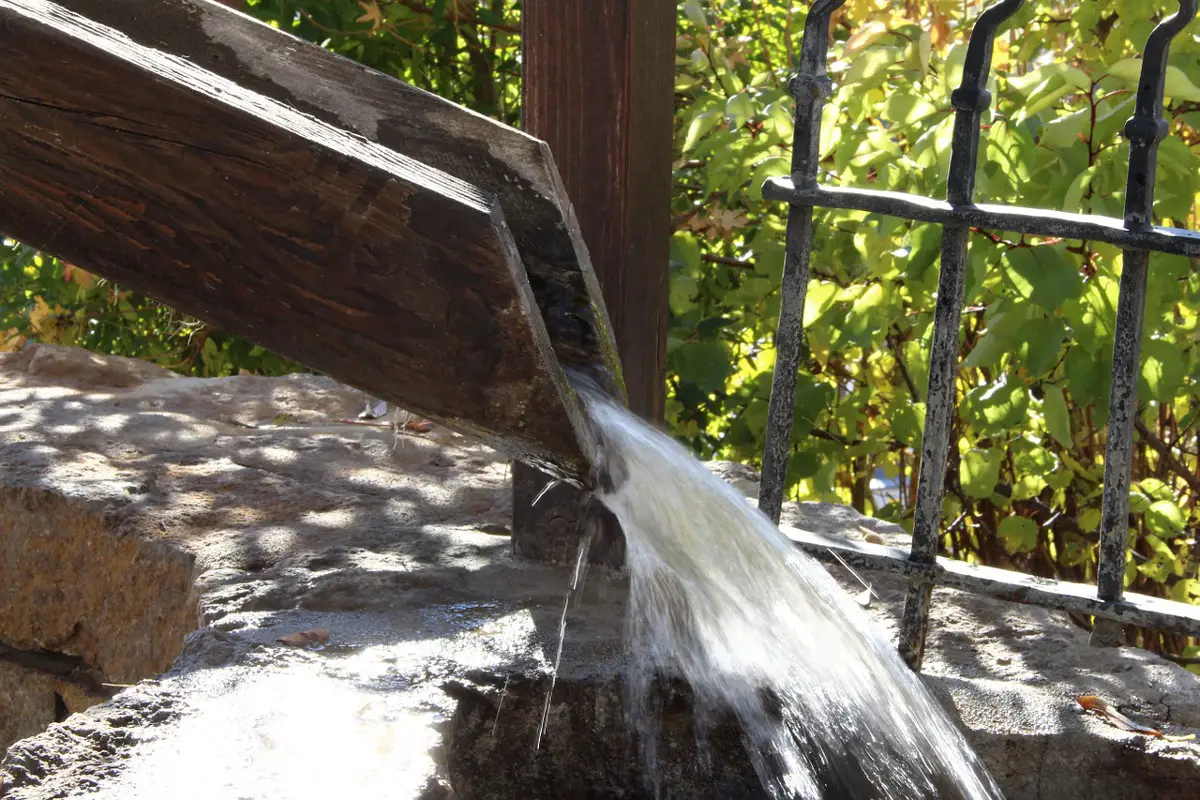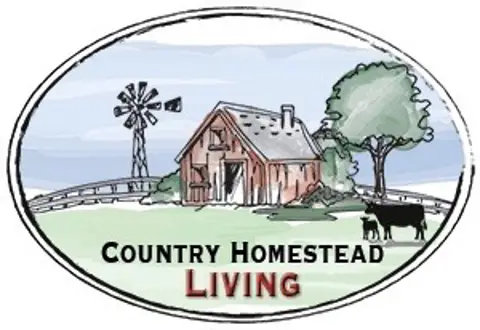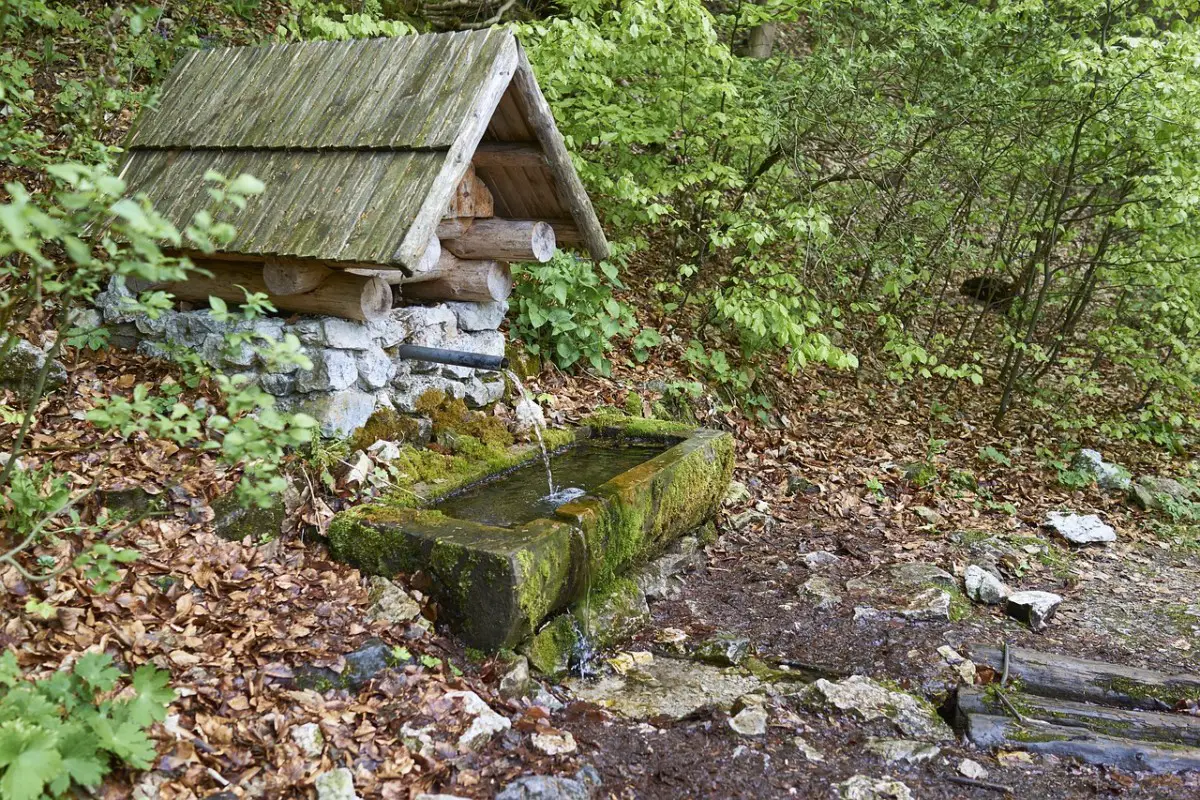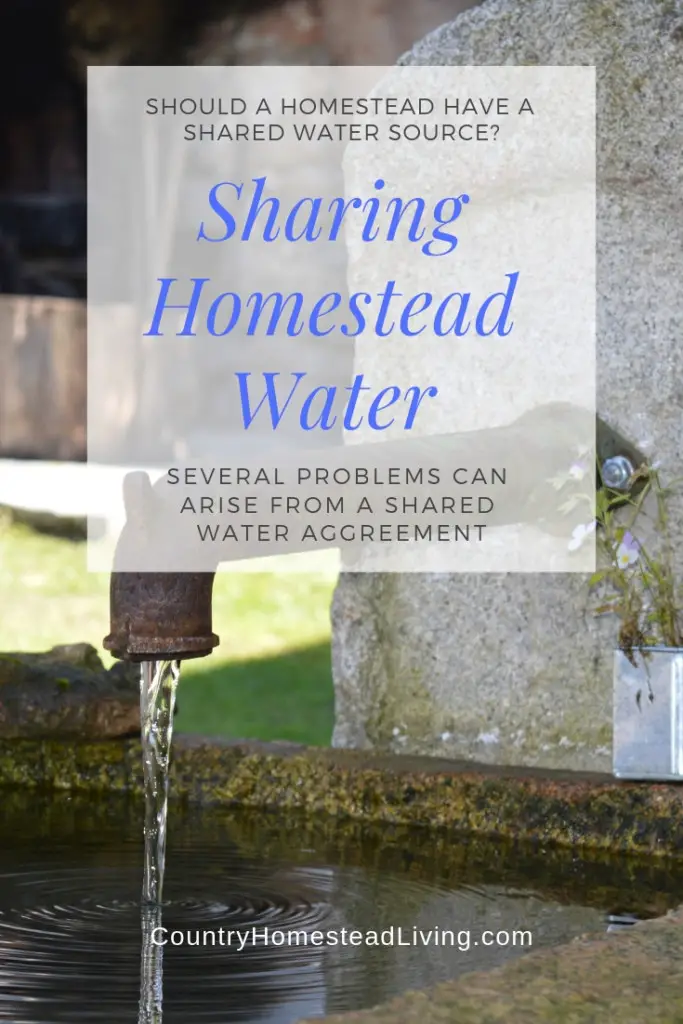One excellent way to guarantee that your homestead experience will be unsatisfactory is to share a water source with an adjoining landowner.
When I’m asked to give an opinion on a piece of property the verbal description sometimes goes like this…
“I have found a great place for a homestead.
It has a house, garden area, place for chickens and a small barn and pasture area.
There is an area where an orchard could be planted.
This property shares a well with the adjoining property.”
Should a Homestead Have a Shared Water Source?
No, having a shared water source creates problems such as: What Water Rights do you really have; How is water divided in a drought; Will you be able to increase the homestead water needs; What are you going to do if the water is cut off.
In every case when I have been asked this question it turns out that the shared water source is not on the land that is for sale.
The shared water source is on the property being kept by the Seller.
Water Is The Life Blood Of A Homestead
The purpose of homesteading is to become self sufficient.
And to change your lifestyle from one of dependency on goods and services controlled by others.
To being in control of as many of the goods and services needed for operating a homestead as possible.
If you do not have your own water source that you are in control of on your homestead you are setting yourself up for failure as a country homesteader.
Because someone else is in control of the most essential element of a homestead, water.
Everything you do on a homestead is governed by water!
You need water for the garden, berry bushes, orchard, live stock and for those who live on the homestead.
For an idea of how much water is needed for a small homestead you can read my article, “Daily Homestead Water Needs (Determining Amounts Necessary).”
Water is truly the life blood of a homestead.
Let’s take a look at some of the problems and laws that effect the life blood of a homestead.
And prove the need to have your own source of adequate water on your own homestead.
Water Rights Laws
This is a brief look at a few key factors of water rights laws in America.
Other countries may have similar water rights laws that will need to be researched if you are considering purchasing land there.
A general rule of the thumb is that when a parcel of land is subdivided and the source of water is only on one of the subdivided parcels, the other parcel or parcels lose any rights to that source of water.
The only way to regain the lost water rights is for the subdivided parcel or parcels to again be joined with the parcel containing the water source as one complete parcel of land.
Because of this water rights general rule of the thumb, any parcel of land separated from the parcel with the water source will have a contract commonly called a Shared Water Agreement.
This agreement is offered to potential purchasers of the land that does not have the source of water as an incentive to induce them to buy the land without a source of water on it.
Before discussing the problems inherent in a Shared Water Agreement, there is one other water rights concept that needs explanation.
That concept is called a prior appropriator.
A prior appropriator is someone who has prior rights to the water coming from that water source.
All prior appropriators have first rights to the water.
And anyone else in a Shared Water Agreement has only the right to what ever water is not needed by the prior appropriator.
So by purchasing land with a shared source of water that is owned and controlled by someone else, it means your rights to some of that water under the water rights laws are limited to only the water the prior appropriator does not need for his own usage!
In other words, under the water rights laws you get the left over water.
If there even is any left over water that is!
Shared Water Agreement
A Shared Water Agreement is an agreement between the holder of property that has the shared water source and the purchaser of property that does not have the shared water source.
This agreement typically spells out that the holder of the water source is willing to share water with the purchaser of the adjoining parcel of land with no water source under certain terms and conditions.
These terms and conditions usually include sharing the cost of pumping the water.
And sharing the costs to maintain and service the water system – the well.
Any related pipes and holding tanks that may be used for the water system would also be included.
The most common terms in a Shared Water Agreement that involves two landowners is a 50/50 split of all cost associated with the shared water system.
The agreement usually includes the well’s production of water in gallons per minute (GPM) flow.
The GPM rate of flow is deemed or assumed to be sufficient for both parcels of land supplied by the well.
This agreement may be called a Shared Well Agreement.
There Are Several Problems That Can Arise From A Shared Water Agreement
Now we will take a look at just some of the most common problems that can arise from purchasing or owning property with a Shared Water Agreement.
What If There Is A Drought Or Unusually Long Dry Spell?
Under the agreement the assumption, or even the stated division of available water, may be an equal share of whatever amount of water is available.
That may sound somewhat reassuring.
However, human nature being what it is, do you want to be dependent on an equal share of water in this situation when there is a real possibility of the prior appropriator losing crops or live stock due to the drought?
What If You Need To Increase The Size Of Your Garden Or Orchard?
Since you do not control the water source, do you think you can expect to receive an increase in water to allow for your planned increase in the size of garden or orchard?
What if the needs of both parcels of land are already stretching the well’s output to the limit?
Can you really expect to be able to implement the desired increases?
You already know that the answer to that last question is “No,”
What If The Landowner Who Has The Source Of Water On His Land Wants To Increase The Size Of His Garden Or Orchard?
The agreement may say water is shared evenly.
But you are not privy to how much water is left over after the prior appropriator’s needs and your needs are met.
What if the increase in water needs of the prior appropriator results in there not being enough water left over for your uses?
Sure, the agreement may say an even distribution of available water but what does the water rights laws say?
The prior appropriator has rights to all the water he needs even if there is not enough left over for the needs of the owner of the parcel without the source of water.
With the water rights laws favoring the prior appropriator.
And with the prior appropriator being the one in control of the source of water.
What are your chances of getting the water you need if he increases the size of his garden or orchard and that takes water that used to go to you?
You won’t be getting the water you were used to getting!

What Would You Do If For Any Reason Your Source Of Water Is Cut Off?
There are basically three options.
You can beg.
You can threaten.
And you can sue under the agreement for water.
Begging will probably not result in a solution.
Threatening can make an enemy out of a neighbor who controls your water source.
That is not the way to survive on a homestead!
That leaves just one option – suing.
- To sue for water you have to hire an attorney.
- Attorney’s cost money.
- The attorney has to file a law suit in court.
- That takes time.
- Then there is a period of time that the prior appropriator’s attorney has to answer the law suit.
- That means it takes more time.
- Then there is a period of time when there can be pretrial negotiations between the sides.
- That means more time without water.
- There is no guarantee that these negotiations will solve the problem. If they do not solve the problem then there is a trial.
- It can be a period of time before the trial comes up in court and that means more time without water.
By now your stress level is somewhere in the stratosphere.
And the garden may be beyond salvaging.
With the lack of water some of your live stock may even be dead or dying.
So far you have invested a good amount of time and money.
And have nothing but increased stress as a result.
After all this you could even lose the lawsuit!
Depending on why your water was cut off, the outcome of the lawsuit could be determined by the water rights laws and not the Shared Water Agreement.
There is never a guarantee of winning a lawsuit that involves water rights and a shared agreement.
But even if you win, you lose!
Now your water source is controlled by an enemy.
Not the best way to live in the country or on a homestead.
In the western United States the most common lawsuit involving property is a lawsuit over water rights.
What About A Private Water Company?
If you are only looking for a small plot of land and don’t mind neighbors driving by, a property serviced by a private water company may be OK.
This Private Water Company should be formed under the laws of the State.
There should be a water holding tank of sufficient capacity.
The water company’s well should have sufficient output to handle the water needs of those supplied.
Make sure there is a back-up pump system in place in case of a primary pump system failure.
We lived in a house in the Northwest that was serviced by this type of private water system for several years.
Most of the time it worked satisfactorily.
But we still kept enough water stored to prepare meals, wash dishes, flush toilets, sponge bathe, and have water for animals for several days.
There were times when the water system was down due to breaks in the line, power outages or other needed repairs.
One time it was off for an entire week!
The major problem with getting water from a Private Water Company is that it is the water company who controls the supply.
They also set the prices, determine the repairs and how quickly they will be done.
This solution is markedly better than a Shared Water Source.
But there can be times when the water is off and it takes several hours or longer to learn what the problem is and when the water will be coming back on.
Getting water from a Private Water Company has a trade off.
That trade off is a loss of some of your independence.
Since you do not control the well you can’t install a back up hand pump for water when the power is off.
You are dependent on others whose values may not be the same as yours.
There Is Only One Way To Avoid The Potential Problems Of A Shared Water Source
Never, ever, under any circumstances purchase land that does not have it’s own source of adequate water proven before closing the sale of that property!
If there is not an adequate source of water, look for land elsewhere.
And avoid the problems associated with a shared water source.
Even an agreement to share water made in writing, is not adequate protection for your Country Homestead!
Related Questions
How do you get water without a well?
If you do not have a spring, creek, pond, or river that touches your property, you get to haul it in in anything from 5 gallon water containers to 55 gallon drums.
A 55 gallon drum of water approaches 400 pounds of weight.
So don’t buy land without a proven source of water!
What are the alternatives to water wells?
The alternatives to water wells include a Private Water Company, springs, creeks, ponds, or a river that touches your land.
If the River is a protected Trout Stream you will get into trouble taking water from it.
A well is the most common source of water in rural areas.
Are there any other alternative sources of water?
There are two.
Collecting rainwater, if collecting it is legal in your State.
And using grey water to water portions of a garden, both of which I talk about in “How Can Insufficient Homestead Water Supply Be Improved?”
You have to have a source of water before you can get grey water.
The best way to be sure you have water on land is to not ever buy land unless there is a proven source of water on it as I discuss in “Financing Land – Undeveloped Land, Conventional Loan, Water.”


